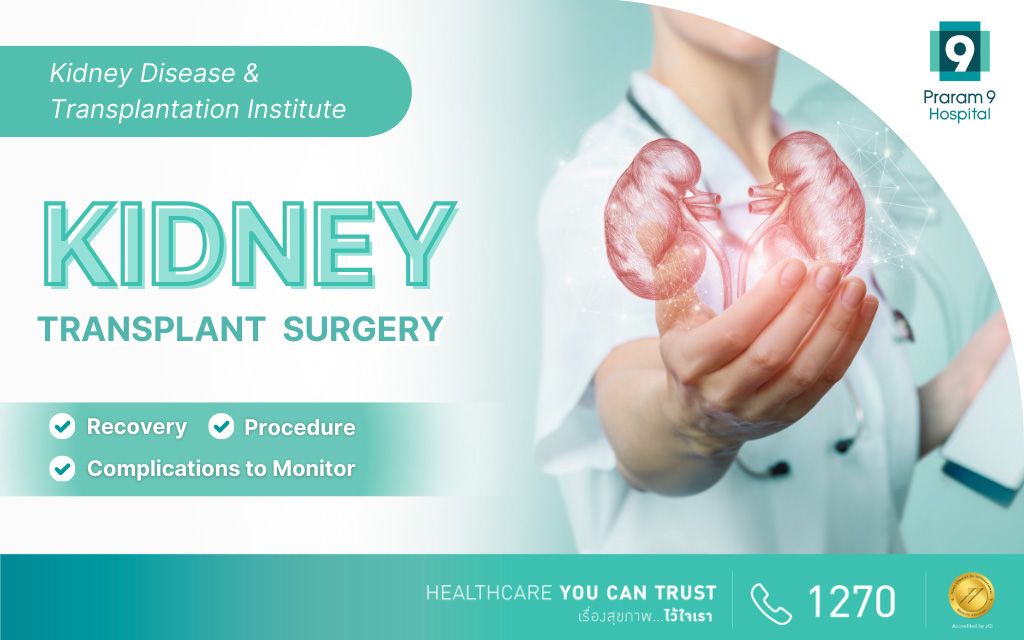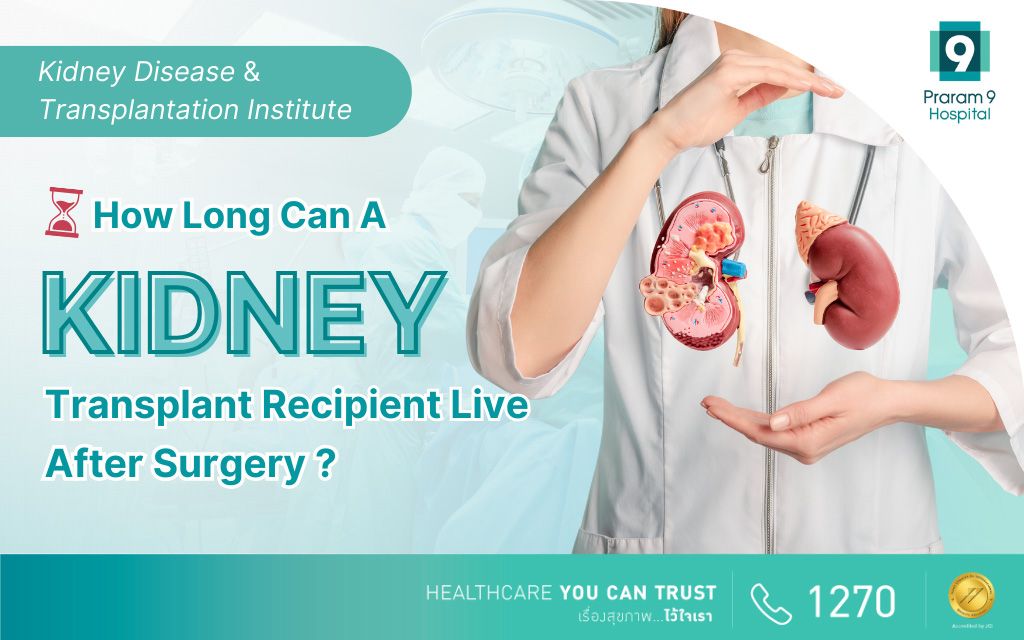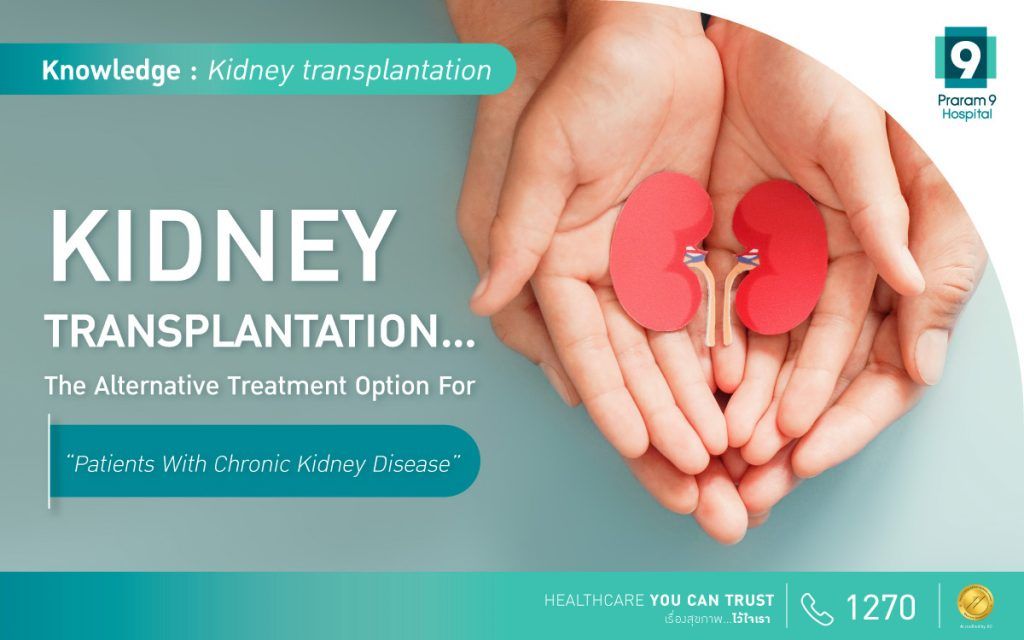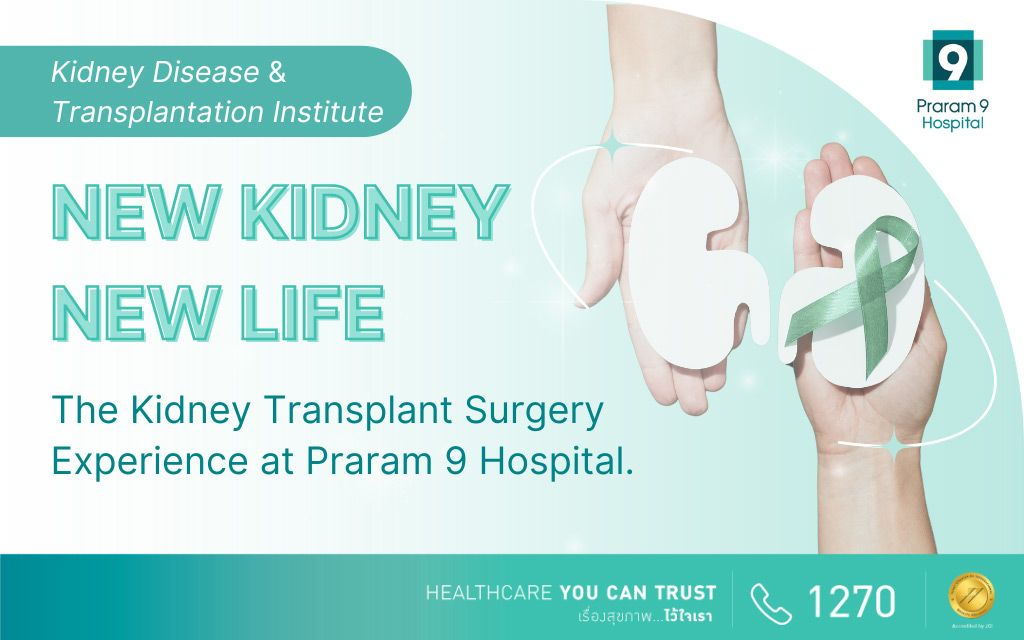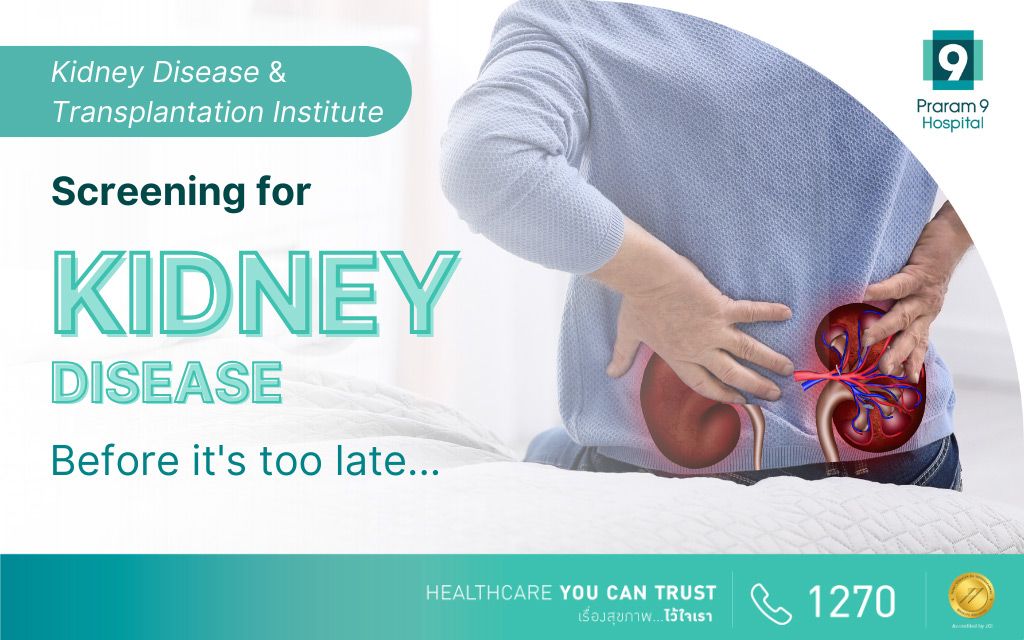Kidney Disease and Transplantation Institute

Operating Hours
Open daily from 07:00 to 20:00.
Page Information
Video consultation with doctors via video call (Telemedicine)

Video Consultation with Praram 9 V
Video Constulation with Doctor at Anytime, Anywhere via PRARAM 9 V
Praram 9 Hospital
Operating Hours
Open daily from 07:00 to 20:00.
The kidneys are vital organs in the body’s excretory system. Their main functions include filtering waste and toxins from the blood and excreting them through urine. They also help regulate water and electrolyte balance, produce hormones that support blood pressure control, and contribute to red blood cell production.
When kidney disease occurs, the kidneys can no longer function fully, causing waste and toxins to accumulate in the body. This can lead to long-term health problems and may progress to kidney failure, requiring dialysis or kidney replacement therapy.
Warning Signs of Kidney Disease
If you experience these symptoms, you should consult a doctor for proper diagnosis:
- Fatigue, weakness, exhaustion, easy tiredness, irritability
- Loss of appetite, nausea, vomiting
- Swelling
- Peripheral neuropathy causing numbness in hands and feet
- Lower back pain at the waist area
- Muscle twitching, cramps, and muscle weakness
- Low blood calcium and osteoporosis
- Frequent urination at night
- Anemia
- Low immunity and frequent infections
Medical Team at the Kidney Disease and Transplantation Institute
The Kidney Disease and Transplantation Institute at Praram 9 Hospital (Kidney Center) consists of specialists with American Board certification from the United States and the United Kingdom, including:
- Nephrologists
- Kidney transplant surgeons
- Vascular surgeons
- Urology surgeons
- Hematology and pathology specialists for transplant evaluation
- Infectious disease specialists for organ transplant patients
- Cardiologists
- Pulmonologists
- ICU specialists
- Psychiatrists
- Radiologists, etc.
Other specialists also provide care before and after kidney transplantation, working together as a multidisciplinary team—an essential component of patient care.
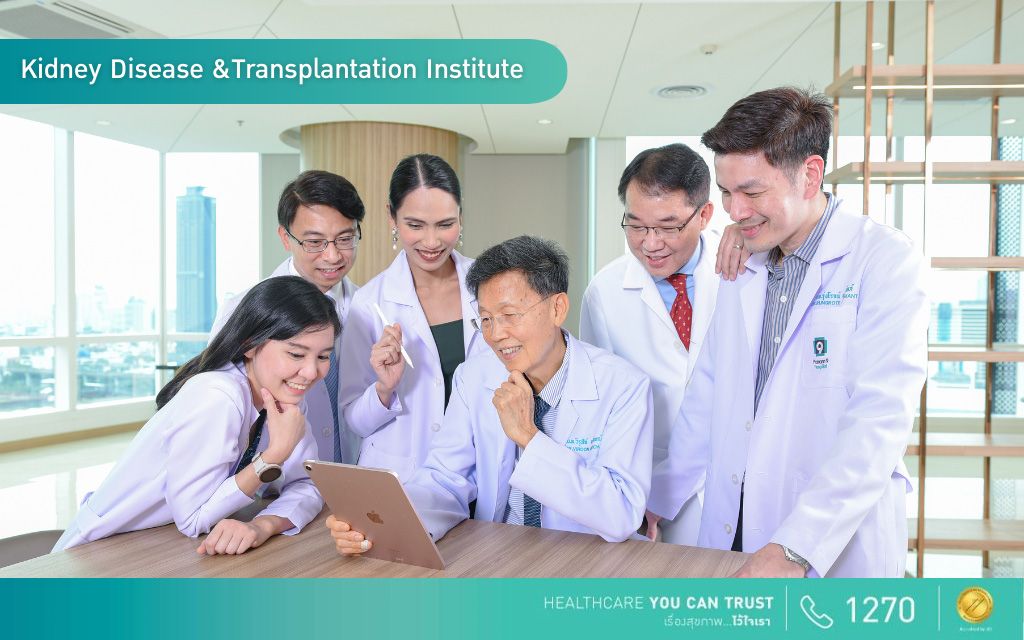
“Praram 9 Hospital has a Transplant Committee and an Ethics Committee to ensure that all transplant procedures follow ethical standards, the Medical Council regulations, and Thai law.”
Personnel Readiness
The institute also has well-prepared support teams, including:
- Transplant coordinators
- Renal nurse coordinators
- Renal nurse counselors
- Dialysis nurses specializing in pre- and post-transplant care
- ICU nurses for post-transplant and complication management-
- Operating room nurses
- Laboratory specialists for immunosuppressant level testing
- Pharmacists specializing in immunosuppressant medication management
- Dietitians providing nutrition guidance before and after transplant
- Physical therapists for post-transplant rehabilitation
Services at the Kidney Disease and Transplantation Institute
Kidney Transplantation
The institute has extensive experience in kidney transplantation. Over 33 years (June 1992 – 30 September 2025), a total of 1,436 kidney transplants have been performed, including:
- 403 kidneys from genetically related donors
- 36 kidneys from legally married spouse donors
- 997 kidneys from deceased donors via the Thai Red Cross Organ Donation Center
Praram 9 Hospital has also performed kidney transplants in 472 patients aged over 60 years:
- Age 60–69: 364 patients
- Age 70–79: 97 patients
- Age 80+: 11 patients
Re-transplantation: 115 patients who previously experienced graft failure
Pregnancy after transplant: 5 pregnancies, 7 children born to transplant recipients
Services include:
- Kidney transplant evaluation
- Living donor kidney transplantation
- Spousal donor kidney transplantation
- Deceased donor kidney transplantation via the Thai Red Cross Organ Donation Center
- Re-transplantation
Post-Transplant Care
- Surgery to correct abnormal kidney blood vessels after transplantation
- Surgery to correct urinary tract and bladder issues after transplantation
- Tissue biopsy for post-transplant complications
- Treatment of abnormal graft function, including rejection
- Treatment of post-transplant infections such as bloodstream infections, pneumonia, gastrointestinal infection, liver infection, peritonitis, urinary tract infection, central nervous system infection, CMV infection, BK virus infection, severe fungal infection, etc.
Dialysis Services
- 24-hour emergency dialysis
- Dialysis for toxin accumulation
- Hemodialysis for chronic and acute kidney failure
- Peritoneal dialysis for chronic kidney failure
- Plasmapheresis
- Correction of all types of vascular access problems
- Surgery to create special vascular access for hemodialysis
- Surgical correction of vascular access complications
Kidney Health Check-up
- Evaluation of kidney function and efficiency
- Physical examination to detect diseases related to or at risk of causing kidney failure
Academic, Research, and Social Contribution
Praram 9 Hospital has continuously presented kidney transplant research at national and international conferences from 1996–2025, with a total of 64 academic works, including:
- Excellent Long-term Outcomes of Kidney Transplantation Using Kidneys from Deceased Donors with Acute Kidney Injury, Presented at The World Congress Transplantation Society, Vancouver, Canada 15 – 19 August 2010 (Oral Presentation)
- Prevalence of Pretransplant Infections among South East Asian Kidney Transplant Recipient. Presented at 24th International Congress of The Transplantation Society,15-19 July 2012. Berlin, Germany (Oral Presentation).
- Incidence and Outcome of Parasitic Infection after Kidney Transplantation in Thailand. Presented at 26th International Congress of The Transplantation Society,18 – 23 August 2016, Hong Kong. Oral Presentation
- Outcomes of Kidney Transplantation Using Kidneys from Expanded Criteria Donors and Donors with Acute Kidney Injury in Thailand. Presented at 26th International Congress of The Transplantation Society,18 – 23 August 2016, Hong Kong. (Oral Presentation)
- Prevalence and Outcome of Kidney Transplantation from organ donor infected with syphilis. Transplantation 2020, September; 104(S3)
- Comparison of the immunogenicity of ChAdOx1 nCoV-19 vaccine against the wild-type and delta variants in kidney transplant recipients and healthy volunteers. Am J Transplant 2022, May; 22(5)
In 2019 (B.E. 2562), two research works were presented at the global conference ESMO Asia Congress 2019, held from 22–24 November 2019 in Singapore, as follows:
- The efficacy of immune check point inhibitor and platinum-base chemotherapy in advanced urothelial carcinoma: A single institution experience.
- High Incidence and Mortality of Transitional Cell Carcinoma in Thai Kidney Transplant Patients.
In 2023 (B.E. 2566), two awards were received at the Annual Meeting of the Nephrology Society 2023:
- Oral Presentation: 3rd Prize for the topic HIGH INCIDENCE AND HIGH MORTALITY OF UROTHELIAL CARCINOMA IN THAI KIDNEY TRANSPLANT PATIENTS
- Poster Presentation: Top 3 Best out of 86 entries for the topic INCIDENCE AND OUTCOME OF KIDNEY TRANSPLANT DONOR BACTEREMIA IN THAILAND: A COMPARISON OF TIME TO BLOOD CULTURE TEST
"Most recently, in 2024 (B.E. 2567), a research work was presented at the Annual Meeting 2024 of the Nephrology Society of Thailand, held from 2–4 August 2024 at The Zign Hotel, Pattaya, Chonburi Province, on the topic:
PATIENT AND GRAFT SURVIVAL IN ELDERLY THAI KIDNEY TRANSPLANT RECIPIENTS"
In terms of social contribution, Praram 9 Hospital has participated in kidney transplant initiatives to support society, including:
- The Kidney Transplant Royal Merit Project for the 80th Birthday Anniversary in 2004 (B.E. 2547)
- The Kidney Transplant Royal Merit Project for the 80th and 84th Birthday Anniversaries in 2016 (B.E. 2559)
- The Kidney Transplant Royal Merit Project for the 60th Birthday Anniversary of Her Royal Highness Princess Maha Chakri Sirindhorn in 2014 (B.E. 2557)
To enhance the quality of care, the Kidney and Transplant Institute has continuously improved and developed its medical services to meet international standards. This includes establishing treatment guidelines, defining safety indicators, evaluating surgical outcomes, and setting standardized patient care protocols. These standards ensure that all medical personnel follow the same approach, enabling patients to receive care that aligns with globally recognized guidelines.
In 2016 (B.E. 2559), the Kidney and Transplant Institute of Praram 9 Hospital received the Clinical Care Program Certification (CCPC) for kidney transplant patient care from the Joint Commission International (JCI), USA.
This certification recognizes the management of complex or high-risk conditions, with strong emphasis on patient safety standards.
Location :
Kidney Disease and Transplantation Institute, 3rd Floor, Building A, Praram 9 Hospital
Operating hours :
Open daily from 07:00 to 20:00.
Contact Information :
Tel 1270/ +662 202 9999, Email : [email protected]
Center Physicians
All Doctors in the Center
Related Health Articles
View All
Copyright © 2024 All Rights Reserved | Praram 9 Hospital









